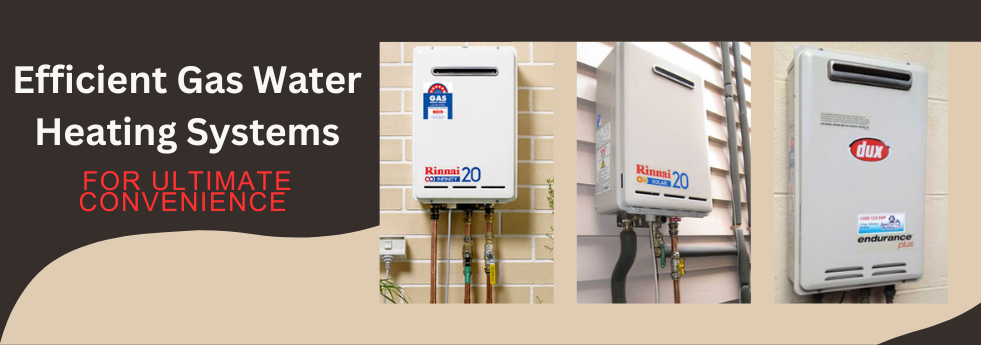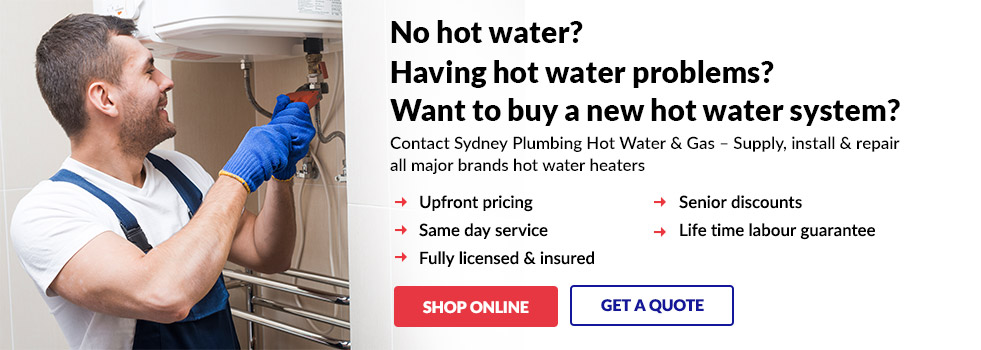Gas hot water systems are designed to deliver hot water on demand. Fuelled by gas, they’re a popular option for home heating needs. They are available in different types, such as gas storage, instantaneous or continuous flow, and gas solar systems and offer design versatility. Their intelligent engineering ensures instant hot water, space-saving features, and the potential for a constant supply of hot water, catering to various homeowner needs efficiently.
Types of Gas Water Heating Systems
Gas hot water systems are mainly categorised into storage and instantaneous systems, offering superior energy efficiency compared to electric heaters.
- In a gas storage system, water is heated by a gas burner underneath an insulated tank. Its quick heat recovery time makes it suitable for large families with high hot water needs.
- On the other hand, an instantaneous gas system heats water instantly upon demand by igniting the gas burner and passing water through a heat exchanger, making it a more efficient option than electric or solar systems.
If you’re considering a hot water solution, gas systems provide both efficiency and convenience. This blog unearths the available options and important considerations for making an informed decision for your home’s hot water needs.
Choosing the Perfect Gas Water Heating System for Your Home
It would help if you considered the below-mentioned factors when deciding on the perfect gas-hot water system for your household:
- The number of members and bathrooms in your home.
- The age of your residence.
- Simultaneous use of hot water by appliances.
- Frequency of bathing.
- Local climatic conditions.
It’s vital to consider these aspects when selecting the most suitable gas-water heating system for your requirements.
- You’ll get gas hot water systems in indoor and outdoor models, giving homeowners flexibility. Typically, indoor units offer superior energy efficiency and quicker heat recovery.
- On the other hand, outdoor models may be more economical upfront but could result in higher greenhouse gas emissions if not powered by renewable energy sources.
Determining the Right Size for Your Gas Water Heater
The size of your gas hot water system is crucial and depends on several factors, including:
- Family size
- Home size
- Water consumption habits
- Operating schedule (off-peak or on-peak hours)
Water usage is a vital determinant in sizing a gas-hot water system. In colder regions, a larger unit may be required to meet heightened hot water demands. Conversely, in sunnier locales with abundant solar energy, a solar hot water system could offer better efficiency.
Comparing Indoor and Outdoor Gas Water Heating Systems
Deciding between indoor and outdoor models of gas hot water systems depends on your specific needs and preferences. Here’s what to consider:
Indoor Systems:
- Indoor systems have a higher initial cost.
- Operational expenses are higher.
- They are prone to rust if not correctly maintained.
- They may experience heat loss over time.
Outdoor Systems:
- LPG costs are higher than natural gas.
- They are pricier to purchase and install.
- They are less effective in shaded areas.
- No hot water during blackouts because of electric ignition.
- There is a potential necessity for multiple units for larger homes or increased hot water demand.
Prominent Gas Hot Water System Brands and Models
When you want to select a dependable and efficient gas hot water system, it’s essential to consider renowned brands like Rheem, Rinnai, Dux, Bosch, and Aquamax. Highly acclaimed models include Joolca HOTTAP, Dux Prodigy 4, Dux Always Hot Continuous Flow, Smarttek Black Smart Hot Water System, Rinnai Infinity Range, Rheem, Aquamax, Solahart, Chromagen, and Vulcan, which are esteemed for their reliability in providing hot water.
Comparing these models using model comparison charts from reputable sources like SA Hot Water or Cheapa Hot Water can provide valuable insights and help your decision-making process.
Gas Water Heating Systems – Installation and Maintenance
The proper installation of your gas hot water system is crucial for its correct functioning. It involves ensuring adequate ventilation and finding an optimal location for the system to operate efficiently.
If you want to install a gas storage hot water system indoors, you’ll need a gas connection and a flue vent or pipe. Installation may take around 2 – 3 hours. It includes tasks like filling and testing the tank for leaks, ensuring all plumbing and electrical work is performed by licensed professionals, following the manufacturer’s installation guidelines, and making sure to disconnect the gas and water lines before removing the old system.
Expert Installation
Professional installation ensures your system operates at its peak efficiency and enjoys a longer lifespan. It ensures correct installation, leveraging comprehensive knowledge of plumbing and electrical systems to minimise energy usage, accelerate heating, and optimise performance.
Self-installation is not recommended and shouldn’t be attempted as it can lead to:
- Damage to the property.
- Pricier repairs.
- Water leakage.
- Ineffective heating.
- Serious risks like carbon monoxide leaks and personal injury.
Professional installers undergo a 3 to 4-year plumbing apprenticeship and hold the necessary gas fitting licenses and certifications.
The average installation cost for a gas hot water system typically falls between $200 and $400, though this may vary based on the specific system and installation location.
Maintenance
Regular maintenance is vital in enhancing the efficiency, energy performance, and overall longevity of your gas hot water system. Maintenance tasks include:
- Thoroughly inspecting all components.
- Cleaning air filters.
- Checking the condition of the anode rod.
- Inspecting condenser and evaporator coils.
- Inspecting the functionality of the cold-water expansion valve.
- Testing the pressure and temperature relief valve.
- Conducting leak and drip inspections.
- Ensuring thermostat settings are accurate.
- Examining the sacrificial anode.
It’s advisable to schedule servicing for your gas hot water system every six months, especially in areas with challenging water conditions.
Wrapping Up
- Gas hot water systems with gas storage, instantaneous, or solar technology provide efficient hot water delivery solutions, saving space and energy while catering to a variety of homeowner requirements.
- Professional installation and proper maintenance are crucial for gas hot water systems’ optimal performance. It’s imperative to size the system correctly based on household needs and schedule regular servicing to maintain efficiency and prolong its lifespan.
- With superior energy efficiency and environmental benefits compared to electric heaters, gas hot water systems help curtail energy usage, reduce greenhouse gas emissions, and are often more cost-effective due to lower running costs.
Sydney Plumbing’s expert team specialises in repairing and servicing leading hot water brands like Rheem Hot Water Heater Systems and Rinnai Hot Water Systems. Contact us today to schedule repairs or maintenance service for your gas hot water system and ensure uninterrupted hot water in your home.

 0402 487 444
0402 487 444







